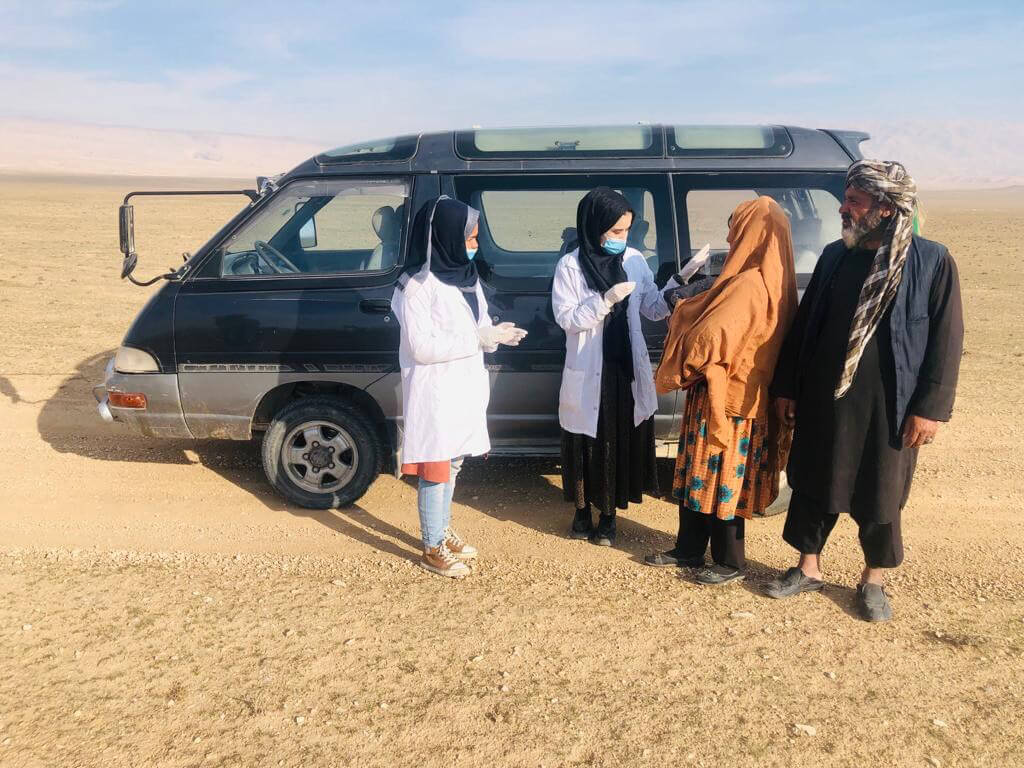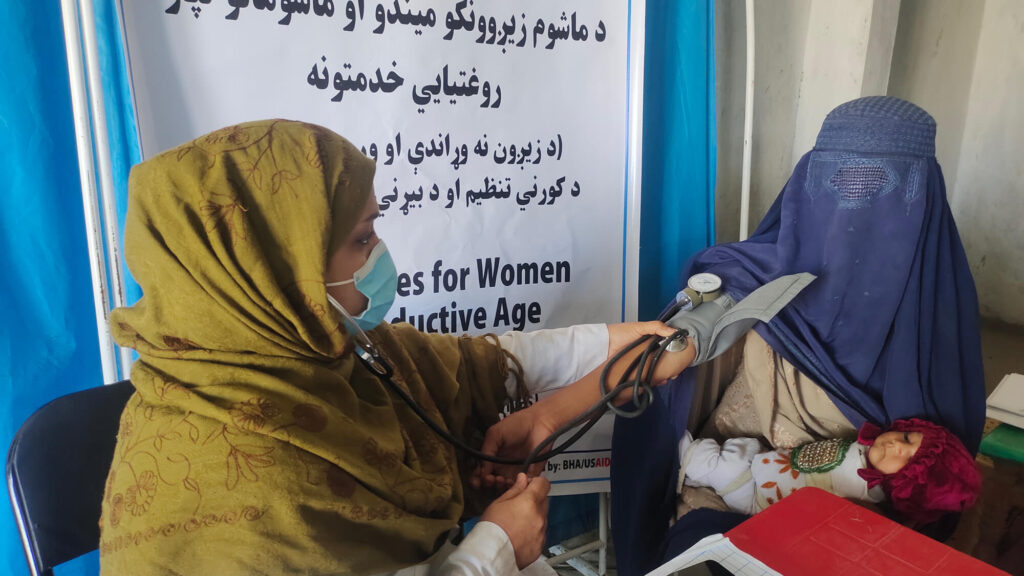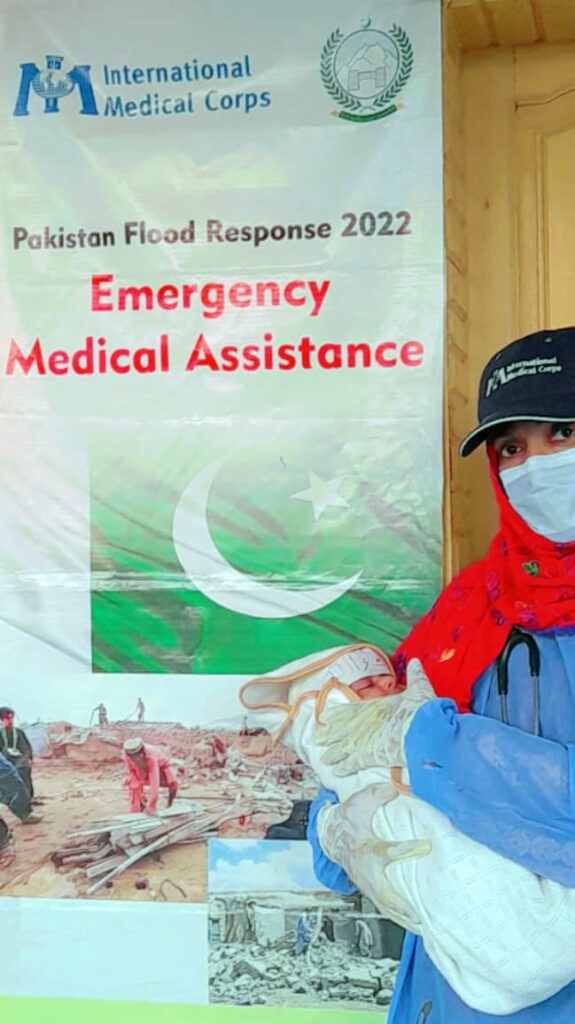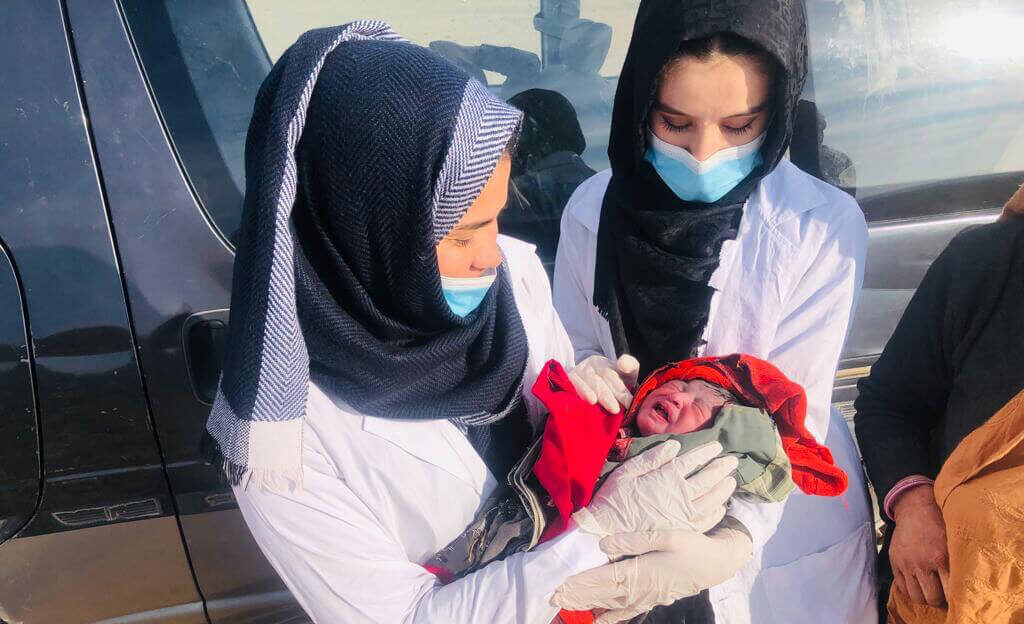International Medical Corps has provided emergency healthcare services in Afghanistan and Pakistan for nearly 40 years. Our mobile teams, which include midwives, doctors, nurses and mental health counselors, travel to far-flung, underserved communities to provide primary healthcare, including maternal care and emergency deliveries. Childbirth does not wait for ideal circumstances—thankfully, our experienced teams are there and ready to take action, as shown in these dramatic stories.
Midwife Safely Delivers Newborn on a Roadside in Northern Afghanistan
Qandi Gul, 40 years old, lives in a small village in Balkh province, where healthcare services are desperately needed. Our mobile team works in the area and regularly travels to her village. Before our team began visiting the area, villagers had to travel to a hospital in the center of the province, almost 200 km away, when they needed healthcare. When Qandi Gul went into labor unexpectedly, our mobile team was on its way to the village—but since they hadn’t arrived yet, her husband, Shah Wali, decided to take her to the hospital.
On the way to the hospital, Qandi Gul’s pain became unbearable. It was clear the baby was coming soon. Miraculously, our mobile team was driving on the same road. Her husband flagged down their vehicle, hoping they would stop and help them. Sharifa, the mobile team midwife, asked the driver of their vehicle to pull over so they could provide assistance. Sharifa is a skilled midwife, and with the support and guidance of the mobile team’s doctor, she examined Qandi Gul and helped her safely deliver a healthy baby girl right then and there, in a vehicle on the roadside.

After providing postnatal care, including vaccinations and breastfeeding guidance, the team told Qandi Gul’s husband he could take his family home—his wife and daughter were both healthy.
“We thank the mobile team midwife and doctor who saved my wife and daughter,” he said, promising to name their newborn daughter Sharifa after the midwife who delivered her.
“Afghanistan remains one of the most dangerous places in the world to give birth,” explains Sharifa. “Childbirth without a skilled attendant represents a major threat to the survival and well-being of Afghan women and their newborns.”
Doctor Saves Yasmeen and Her Newborn in Eastern Afghanistan
Yasmeen, 28 years old, and her husband and children live with her parents in the Behsud district of Nangarhar province. Her husband is disabled, and she and her family rely on her father’s income. Since she lives in a remote area and her family is impoverished, it’s too far and costly to travel to the nearest health facility.
Yasmeen was pregnant with her third child and in her third trimester when she began experiencing intense labor pains. She asked her mother to take her to the health facility, but her mother declined since they didn’t have enough money.
A neighbor overheard Yasmeen’s cries and advised Yasmeen’s mother to take her to our mobile team, which was on a routine visit to their village. However, Yasmeen was in too much pain to travel even the short distance to seek care from the mobile team, so the neighbor went to the team and asked them for help.
Dr. Nargis, an International Medical Corps doctor and midwife, immediately rushed to Yasmeen’s house, two streets away. She examined Yasmeen and wanted to bring her to the nearest hospital, but it wasn’t possible—Yasmeen’s condition was so severe that she urgently needed immediate care. With Dr. Nargis’s help, after half an hour, Yasmeen delivered a healthy baby boy. Yasmeen and her son were saved, and everyone was happy and relieved.

“Thanks to an International Medical Corps midwife, I am alive today despite having no job and no money while caring for my disabled husband,” Yasmeen explains.
Dr. Nargis has a rich history of providing care in homes, hospitals and communities. She works as a community midwife with International Medical Corps, delivering health-related services, including emergency deliveries and maternal healthcare.
“When I visit communities and provide health services, I feel proud, because Afghans are suffering more now than ever,” she says. “Helping women with their health gives me hope that all these problems will end one day.”
Since January 2022, our 45 mobile teams have provided services to more than 336,000 people in Afghanistan.
Mobile Team Comes to Haseena’s Aid After Floods in Pakistan
In Pakistan, unprecedented monsoon rains and severe flooding have left millions of people in need of healthcare services—straining a fragile health system, diverting resources away from essential reproductive health services and adversely affecting access to health facilities.
According to the United Nations Population Fund, about 5.1 million women in flood-affected areas are of childbearing age, with more than 410,000 currently pregnant and almost 137,000 expected to give birth in the next few months.
Haseena, 26 years old, is a wife and mother who lives in Dosehra village, in the Charsadda district of Khyber Pakhtunkhwa province, an area heavily damaged by flooding. Her husband, Mujahid, works for the government. Their family home was damaged in the floods, and they lost all their valuables. In addition, their local health facility was destroyed.
When Haseena went into labor, a traditional birth attendant—not formally trained or licensed—who lives in her neighborhood examined her and concluded that Haseena would deliver her baby in the next 10 to 12 hours. Haseena was terrified. She did not want to deliver her child at home without a trained midwife or doctor, but she did not have the money or time to reach a functioning health facility.
The next morning, an International Medical Corps mobile team visited her village. Haseena’s neighbor knew of her condition and asked the team for their help.
Nafidat, a health worker with International Medical Corps who specializes in women’s care, examined Haseena and informed her that her delivery would take place in an hour. Nafidat then conducted the delivery in a nearby house—as Haseena’s house is far from where the mobile team provides services—and Haseena gave birth to a healthy baby girl.

Haseena and her husband, Mujahid, were extremely grateful to International Medical Corps.
“I was worried about Haseena and the baby since the health facility here was completely destroyed,” explains Mujahid. “We had no choice except to have the baby delivered by the traditional birth attendant. The International Medical Corps team arrived here as a divine help. I really appreciate the quality of services that International Medical Corps is providing during this time of crisis.”
“I am so happy that I’m part of an International Medical Corps mobile team,” says Nafidat. “I am able to serve people in need—particularly this pregnant woman, who required our services the most.”
After the delivery, Dr. Sadiq, a male physician and leader of the mobile team, examined the baby.
“We never expected to conduct a delivery in such a situation. But thanks to our team, everything went well, and a healthy baby girl was born,” says Dr. Sadiq.
Since January 2022, our three mobile teams have provided services to more than 56,000 people in Pakistan.
